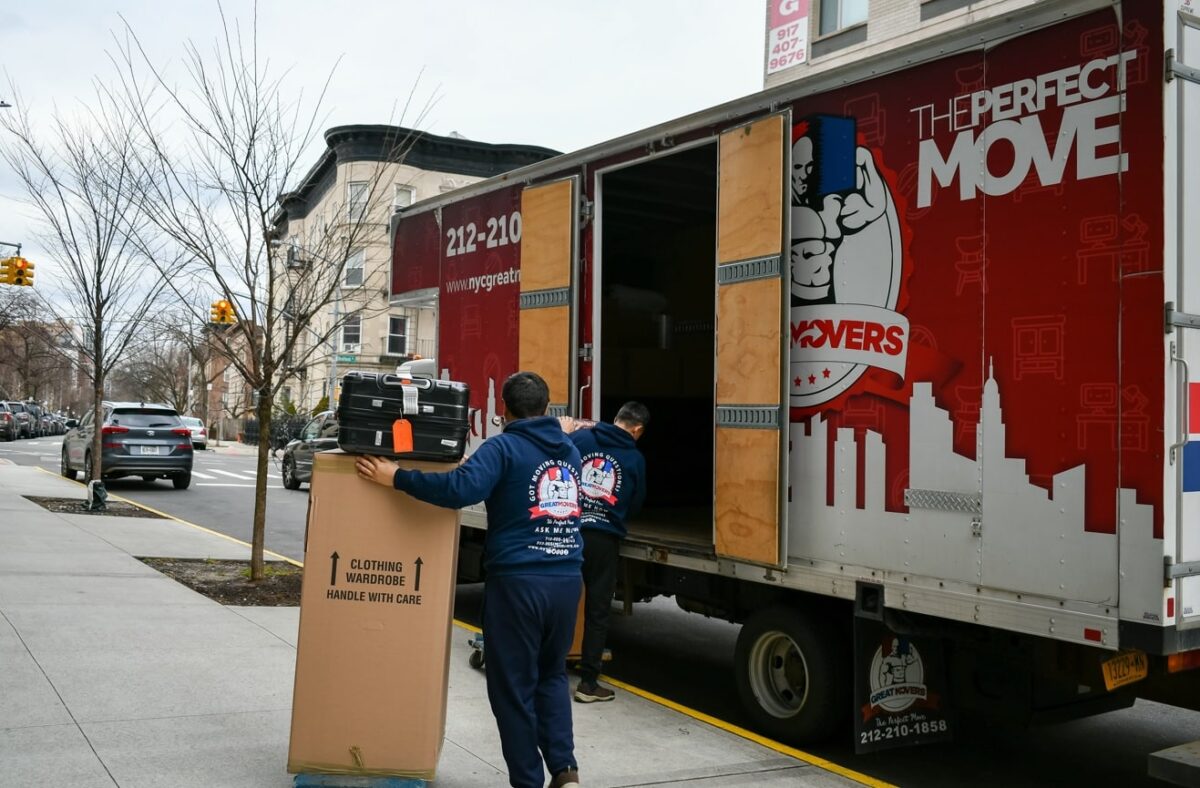Many people find a small local move challenging and plan a few weeks in advance. Moving to New Jersey from another state requires even more preparation and planning, even if you’re coming from the next state over. That doesn’t mean your out-of-state move has to be stressful or difficult. There are plenty of steps you can take to make your NJ relocation a walk in the park.
Visit the Area
Ideally, you’ll be able to physically visit your future home so you can get a good feel for the neighborhood, nearby amenities, and so on. Unfortunately, traveling out of state isn’t always affordable. However, if you can squeeze it into your moving budget, seeing the location firsthand is always a great idea.
If you can’t physically visit your new home, the next best thing is to find digital resources. Your new town or city might have its own social media account. If not, they will at least have their own website where you can check out the calendar of events, announcements, and so on. You can also “walk” the neighborhood with Google Maps to find the nearest park, grocery store, library, and whatever else is important to you. The more you research, the more you will feel comfortable when you actually make the move.
Prepare a Moving Calendar
While you might only need 2-3 weeks for a small, local move, you should start preparing for your interstate move at least a month in advance, if not longer. The best way to make sure you get all your tasks done is to first figure out your move date and then count backward at least 4-6 weeks. If you know you’re going to be busy with work or travel during that timespan, make sure to give yourself even more breathing room. Find and circle the date on the calendar – that’s the day you start with your moving tasks!
Recommended Moving Timeline
| Timeline | Tasks | Notes |
|---|---|---|
| 6–8 Weeks Before Move | Research moving companies, request quotes, and book your mover | Early booking ensures availability, especially in peak season |
| 4–6 Weeks Before Move | Start decluttering, selling, or donating unwanted items | Reduces moving load and overall cost |
| 3–4 Weeks Before Move | Gather packing supplies and begin packing non-essential items | Label boxes by room and contents |
| 2 Weeks Before Move | Notify utility companies, update the address, and confirm the moving date | Ensures smooth transition of services |
| 1 Week Before Move | Pack essentials bag, finalize inventory, and review moving plan with movers | The essentials bag includes toiletries, clothes, and important documents |
| Moving Day | Supervise movers, check inventory, and ensure all items are loaded | Keep important documents and valuables with you |
| 1–2 Days After Move | Unpack essentials, set up utilities, and check for any missing or damaged items | Report issues to movers immediately if necessary |
Don’t just fill in the calendar haphazardly. First, create a list of all the tasks you need to complete. For example, hiring professional movers, packing, shutting off utilities, purchasing packing supplies, changing your address, etc. Make sure to personalize these tasks to match your needs and prioritize them based on how many days you have until moving day. If you plan on hiring a moving company, you should book them at least a month before your move date, especially if you plan on relocating between May through September.
Create a Budget
Moving out of state isn’t cheap. The average cost of hiring professional movers for a long-distance relocation is close to $5,000. Unlike local moves that charge you an hourly rate, out-of-state movers generally offer a fixed rate fee based on the distance, weight, and volume of your move. Ultimately, it means the further you move and the more stuff you have, the higher your final bill. The price only goes up if you include additional services like storage, packing, unpacking, and buying packing supplies.
Even if you decide to do a DIY move, you’ll still need to pay money for a truck or container, moving supplies, and other expenses like gas, tolls, parking, and more. Plus, you’ll have to load and unload the truck yourself. At best, you’ll be sore for the next few days from lifting and carrying heavy boxes and furniture, but at worst, you could seriously injure yourself.
Speaking of budget, don’t forget to include costs outside of the actual moving process, like some takeout food for the day or two after you move into your new NJ home, new decorations, and even new furniture.
Choose a Professional Moving Company
If you can spare the money in your budget, hiring a moving company can make your transition to your new New Jersey home a lot easier. Every move is unique, which is why the most reputable New Jersey movers will walk you through the entire process and come up with personalized moving plans based on your needs and budget. Before you call, figure out what you might need as part of your moving plan. Most movers offer services like packing, storage, and more. If you need a full-service experience where movers do the packing for you, make sure to mention it!
Cost Comparison: DIY vs Professional Movers
| Cost Component | DIY Move | Professional Movers | Notes |
|---|---|---|---|
| Truck / Rental | $100 – $500 | Included | DIY requires renting a truck; pros include vehicle |
| Labor | Free (self/friends) | $500 – $2,500 | Pros handle all loading/unloading |
| Packing Materials | $100 – $300 | $150 – $500 | Pros often include boxes, tape, and padding |
| Fuel / Gas | $50 – $300 | Included | DIY requires paying for gas; pros cover this |
| Insurance / Liability | Optional: $50 – $200 | Included / Optional Upgrades | Pros offer coverage for damaged items |
| Total Estimated Cost | $300 – $1,300 | $4,000 – $6,500 | Professional movers save time and reduce risk of injury |
Always do your research before hiring the company. Look up online reviews on a variety of sites, including Yelp, Google Business, and the Better Business Bureau. Licensed and insured movers also provide their Department of Transportation number, which allows you to search the number to make sure they are up-to-date with their licenses.
Create a Moving File
Filing all documents related to your move is one of the best ways to stay organized and sane. Sure, it’s not fun and is just another thing you have to remember, but you’ll be grateful you have everything in one place. Documents you should store here include:
- Moving-related documents like your estimate, bill of lading, and inventory
- All personal documents related to you, your child(ren), and/or pets. This includes birth certificate, school records, pet-related documents (vet records, etc)
- All related bills and utilities that you will need to call to either cancel or update your address
While you can access many of these documents online, it’s still a good idea to have a hard copy version just in case something happens, especially for places like your doctor’s office. If they don’t have a digital portal, call to get a copy of your health records emailed to you and print it out. When you find a new doctor, you can hand over your health history on the first day.
Declutter
The less stuff you have, the cheaper your move! Take a look at everything you own and filter out anything that you have used in the past year. Chances are, you won’t miss it! After that, try out the 3-second rule, where you must decide in three seconds if you’ll keep an item in your hand or not, and you can’t change your mind after.
If you end up with a lot of things to get rid of, consider hosting a garage sale. Not only will it help get rid of our unwanted items, but it’s also a great way to pad your moving budget. Donate whatever leftover items you have that are in good condition. If you still have a few things left after all that, post them on a local buy nothing group.
Pack Early!
Packing is by far the most time-consuming task. Don’t leave the packing to the last minute. If you want to ensure all of your belongings get to your new home in one piece, you’ll want to set aside a few weeks to pack properly. That includes some prep time to ensure you have all the materials you need, including boxes of various sizes, packing tape, padding for fragile items, and packing paper to fill up any gaps in the box.
Packing Supplies Checklist
| Item | Quantity | Notes |
|---|---|---|
| Moving Boxes | 10 | Various sizes for clothes, kitchen, and fragile items |
| Packing Tape | 5 rolls | Strong tape for sealing boxes securely |
| Bubble Wrap | 3 rolls | Protect fragile items like glassware and electronics |
| Moving Blanket | 1 per large furniture piece | Prevent scratches and damage during transport |
Split up the packing by section or room and start with the location with the least essential items. That might mean your garage, attic, basement, or guest room. Make sure to label each box appropriately with the room the box should go into, as well as basic details on what is inside the box. If you have any fragile items in the box, make sure to write FRAGILE so the movers know to handle them with care.
Don’t forget to pack an essentials bag while you’re at it. Think of this bag/box as what you would take to a two-night stay at a hotel and include all these items. The last thing you want to do after you have moved into your new home is dig through boxes to find your toothbrush.
Make all Necessary Travel Arrangements
Moving long distances means figuring out how you’ll get from your old place to your new one. And no, you can’t hitch a ride with the movers. Depending on how far you’re moving and whether you are moving with kids or pets will determine your travel strategy. If you’re relatively close to your new location (a couple of hours out), you can simply drive to your new location with no issues. For anything further, you might want to plan out meals, bathroom, and other breaks, especially if you’re moving with young children.
For those who live cross-country, a flight will be the fastest and easiest option. However, if you prefer driving, don’t forget to make hotel reservations and plan an itinerary to see some cool things along the way during your road trip. This might not be the best option if you have kids or pets, but it’s great if you’re single.
Move to New Jersey with NJ Great Movers!
If you’re ready to make your move to the Garden State, NJ Great Movers can provide all the information and help you might need. We provide standard long-distance moving services along with other add-ons like packing, unpacking, storage, and more. Reach out to us, and we’ll walk you through the process.
FAQ
Should I move my furniture with me?
Ultimately the decision is up to you. However, the more stuff you bring, the more expensive your bill. Focus on keeping pieces that are in good shape and will last you for many more years to come.
Can I track my moving truck?
Many professional moving companies have a GPS tracker on their trucks. If you’re curious how far away your truck is, call up the company and they can provide accurate location information.
When will my moving truck arrive?
Depending on how far you are moving, your trucks can take between 1-2 weeks to arrive at your new location. If you opted for the consolidated shipping, your items will arrive during a one-week delivery window. For express shipping, you get to choose drop off day so you know exactly when your items will arrive.



